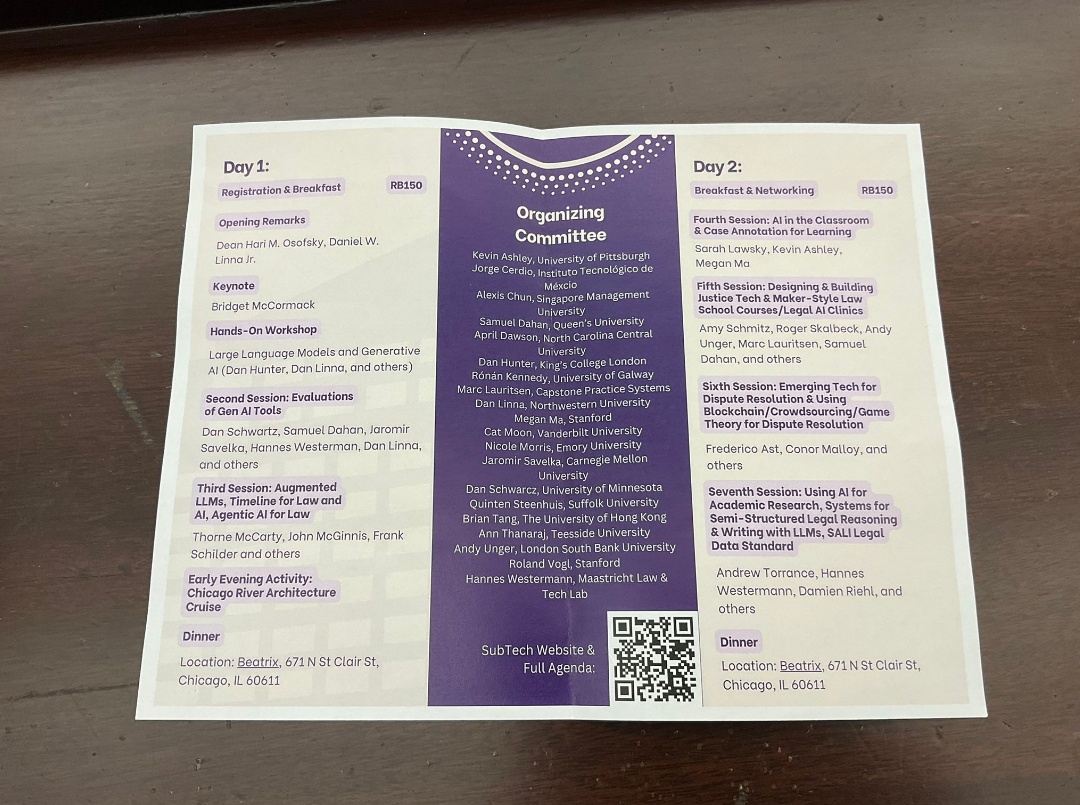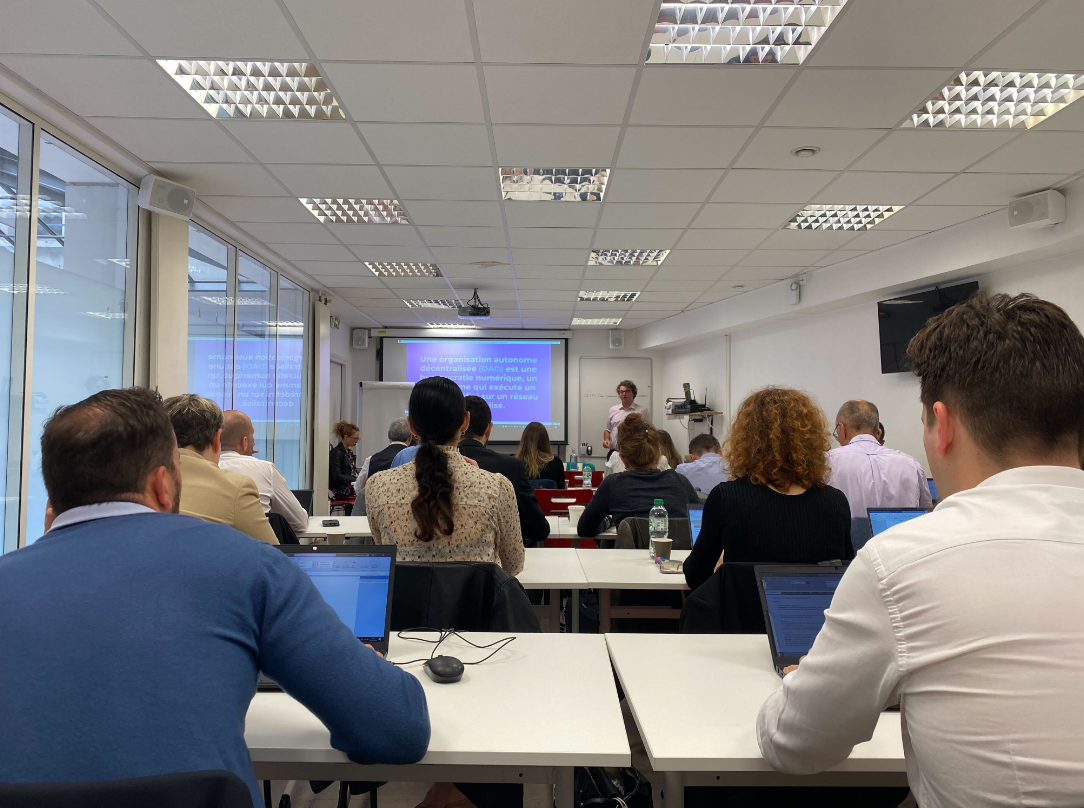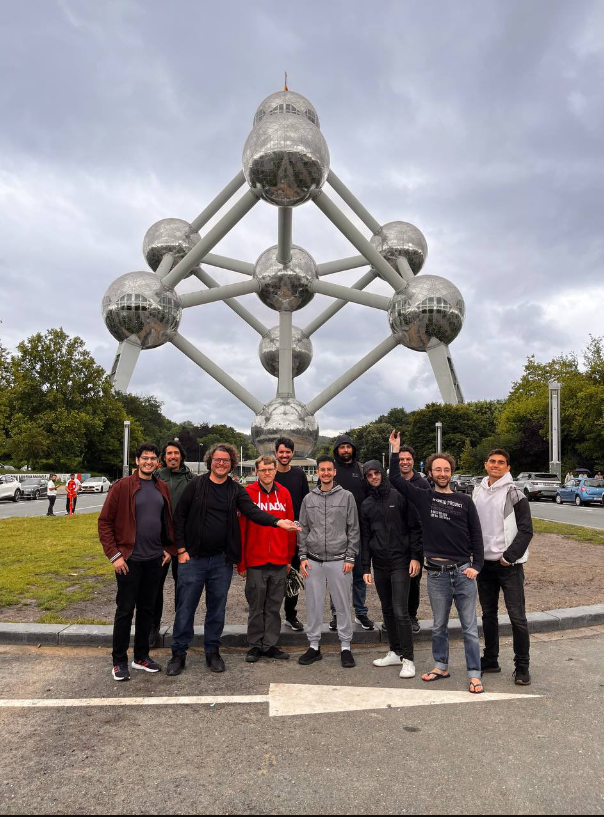Kleros Project Update 2024

A look at the past year, giving you a full insight into what's been happening in the Kleros Republic...
Coopérative Kleros, the main entity currently developing the Kleros protocol, is a mission-driven company with a focus on positive social impact with four key drivers behind it:
- Justice Inclusion. Our mission is to contribute to the development of a protocol for secure, affordable and fast dispute resolution. The successful completion of the project has the potential to greatly increase access to justice opportunities for people around the world.
- Open Source Technology Development. The Kleros protocol is open source and free for anyone to use. The Cooperative holds no patents on any of its code or other developments, which are freely accessible via Kleros Github.
- Open Research. All research activities conducted by the Cooperative are published openly and free for anyone to use.
- Education. The Cooperative also engages in the important activity of educating the public. Different educational activities are conducted in partnership with academic and business organizations in order to foster awareness about decentralized justice.
Let's have a look at the landmark moments of the year behind us, assorted by the above mentioned topics.
Research Activities
As usual, the Kleros' research team maintained a vibrant and active research effort in cryptoeconomics and law, while also participating in conferences to foster the creation of an academic community in decentralized justice.
- Members of the research team published the article “Decentralized justice: state of the art, Recurring Criticisms and Next Generation Research Topics” at Frontiers in Blockchain. The paper is a compilation of our experience in building the Kleros protocol, a survey of third party research on decentralized justice and future paths for research and development.
- Research continued on the incorporation of soulbound tokens (SBTs) into the Kleros protocol, particularly in the juror selection process. Introduced by Weyl, Ohlhaver, and Buterin (2022), SBTs aim to establish social identity information about blockchain users. Current research is focused on the security models of SBT-utilizing mechanisms and their integration with financial incentives in the Kleros protocol.
This is a very cool paper, one of my favorite from the Web3 space for a while. @PluralityInst https://t.co/thKA4ZVDsq
— ⿻(((E. Glen Weyl/衛谷倫))) 🇺🇸/🇩🇪/🇹🇼 🖖 (@glenweyl) January 26, 2024
- Our research on griefing, a concept introduced by Vitalik Buterin as a measure of sabotage effectiveness, culminated in the publication of "An Analysis of Griefs and Griefing Factors'' by William George in Frontiers in Blockchain, volume 6 (2023). The paper examines how griefing can alter system equilibria and the resilience of the Kleros protocol to such attacks.
- A publication on voting and incentives compatible with Schelling-point based systems by William George, titled "Strategic Behaviour and Manipulation Resistance in Peer-to-Peer, Crowdsourced Information Gathering," appeared in Mathematical Social Sciences, volume 124 (2023). The paper explores the constraints of these systems in non-binary outcomes and possible trade-offs.
- The research team explored various voting and incentive systems and their integration into dispute kits for Kleros 2.0, utilizing the new version of the court modular architecture. This included dispute kits for numerical output selection and options with differing dispute win rates.
- Economic experiments were conducted to test the impact of voting and incentive systems on participant responses to attacks and the effectiveness of such attacks. This was published in the blog article “Voting and Incentive Systems in Kleros Cases with Numeric Outcomes”.
- From October 2023 to May 2024, our PhD researcher Yann Aouidef was a visiting scholar at the CodeX Center for Legal Informatics at Stanford Law School. During his stay, he conducted research on law and economics in the context of Kleros.
- Kleros hosted the Stanford Blockchain Governance Summit at Stanford Law School in collaboration with the Stanford Blockchain Club which gathered leading academics and practitioners in blockchain governance.
- In autumn 2023, our PhD researcher Jamilya Kamalova participated in a research exchange at the Hong Kong University. She was also accepted into the Adam Smith fellowship program at the Mercatus Center at George Mason University.
- Jamilya had her article “Exploring Blockchain-Based Alternative Dispute Resolution: Limitations of Traditional Methods and Prospects for Further Research” accepted for publication in the prestigious Harvard Negotiation Law Review. Her article “Proof of Humanity: ethnographic research of a ‘democratic’ DAO” co-authored with Tara Merk, Sofia Cossar and Primavera de Filippi was published by the European University Institute.
- Members of the team participated in different academic activities including the DAO Harvard Conference at Harvard Kennedy School of Government, “Blockchain constitutionalism: the role of legitimacy in polycentric systems” at the European University Institute, the Cambridge Arbitration Day at the University of Cambridge, as well as other activities at Paris 2 Panthéon-Assas, Miami University, Ohio State University, Boston University, Hong Kong University, the National University of Singapore, NOVA School of Science and Technology, Universidad Austral and Universidad Torcuato Di Tella among others.

- The 7th cohort of the Kleros Fellowship of Justice was selected. Participants are researching various topics, including the application of decentralized justice to environmental conflicts, examining blockchain-based dispute resolution in jurisdictions like Brazil, addressing AI-art copyright disputes, and investigating blockchain-based resolutions for scientific misconduct in peer-reviewed journals, among others.
- Kleros has been mentioned in numerous academic papers published across various prestigious outlets.
- The LLM thesis “The New York Convention on the Enforcement of Decentralized Justice Systems’ Decisions: a Perspective from the Evolutionary Interpretation of Treaties” by David Molina Coello won the second place of the 2022-2023 "New Voices in International Arbitration" Young ITA Writing Competition of the Institute for Transnational Arbitration.
- We have launched the Kleros Doctoral Research Support Grant in partnership with the computer science department of the University of Oxford to co-sponsor a PhD researcher who will conduct their dissertation on mechanism design for decentralized justice. The student will conduct their research under the supervision of Dr. Paul Goldberg, director of the MSc in Mathematics and the Foundations of Computer Science and a world leading expert in computational complexity, machine learning, game-theoretic models for data and the decentralized computation of economic equilibria.


Development Activities
Kleros 2.0
Kleros 2.0 is the most important development project currently undertaken by the Kleros team. Its completion will allow for a more affordable and flexible solution to address a larger number of cases.
In 2023, the team launched the Kleros 2.0 testnet, a milestone that represents the culmination of years of work and research.
Federico explaining the main features of Kleros 2.0.
- The core smart contracts of the protocol were made upgradable, making it easier to fix unforeseen issues. The upgradability mechanism can be disabled once the contracts are more battle-tested. The sortition mechanism is now relying on a VRF-based random number generation, which is regarded as a highly secure and fair way of drawing random jurors.
- Considerable efforts were devoted to refining the user interface and experience, including updates to the stake confirmation processes and the addition of new pages, such as the “Buy PNK” page. These improvements aim to make the platform more accessible and informative for users.
- The development team implemented a number of new features and functionalities. The implementation of the Sign-In-With-Ethereum (EIP-4361) allows users to authenticate with the backend services in a standardized way.
- The implementation of cross-chain swaps offers the users a friendly way of onboarding to the court on Arbitrum as they can bridge and swap the tokens they have for PNK without leaving the application.
- The commit-reveal scheme present in Kleros 1.0, which allows the jurors to hide their vote, has been migrated to Kleros 2.0 and enabled by default.
- The Dispute Resolver app, which allows for the easy creation of disputes has been integrated directly into the Kleros 2.0 to provide a more convenient way of creating cases.
- A variation of Kleros 2.0 nicknamed “the University Court” has been created for educational purposes, allowing an instructor to draw attendees to participate in a dispute.
- As part of providing a better experience for the developers of applications arbitrated by Kleros, a dispute preview page has been built, in addition to the SDK.
- The development team has completely redesigned the Escrow application, including a new settlement flow that is nearly ready for use with Kleros 2.0. The Curate application has also been redesigned and is progressing well for use with Kleros 2.0. Additionally, the integration with the Reality oracle for Kleros 2.0 has commenced.
- The team adheres to best practices in secure coding, testing, operations, and code review. Later in 2024, Kleros 2.0 is expected to undergo an external code audit, which will be followed by offering competitive bounties to attract security researchers.
Vea
The optimistic bridging protocol at the heart of Kleros 2.0 has been spun out as a distinct solution named Vea.
- The team has announced, presented and published documentation of Vea's bridging mechanism. A DevNet launch ensued, intended for developers to build on top of Vea.
- A bridge transaction explorer named VeaScan has been built as a development tool.
- The next milestone is focused on the launch of a permissionless version of the protocol with emphasis on security and reliability. To better inform our threat model, the team carried out some chain-specific research including an Arbitrum sequencer downtime analysis and a L1 missing blocks analysis.
- Kleros has joined the Cross-Chain Interoperability Alliance led by the Gnosis Hashi team. Plans are to have Vea integrated into the bridge aggregator Hashi.
Developer Shotaro presenting the Vea Bridge at ETH Taipei. May, 2023.
Proof of Humanity 2.0
Proof of Humanity aims to establish itself as an anti-sybil registry of humans with multiple applications across the Web3 ecosystem and beyond. This protocol will provide essential infrastructure for one person, one vote governance systems and for distributing universal basic income in the form of cryptocurrency.
Within the broader strategy of the Kleros protocol, Proof of Humanity enables a more versatile design space capable of addressing a wider array of use cases, including one person, one vote courts and token-gated courts using soulbound tokens (SBTs).
Kleros has continued its development on Proof of Humanity 2.0, a new iteration of the protocol. In 2023, numerous enhancements were made to improve the platform’s functionality, security, and user experience.
- Throughout the year, the Proof of Humanity 2.0 smart contracts underwent several rounds of internal security reviews, leading to numerous improvements and fixes. These adjustments focused on enhancing security, scalability, and efficiency, including modifications to contract structures and the introduction of new functionalities to better support the platform's decentralized identity verification process.
- Significant progress was made on the user interface, aimed at streamlining the user journey and enhancing overall usability. This effort involved redesigning key components and simplifying the verification process to make it more intuitive.
- The development and optimization of subgraphs were carried out to ensure efficient data handling and retrieval, which are crucial for the frontend’s usability and reliability.
- The team explored and initiated integrations with cross-chain technologies to enhance accessibility and expand the platform's utility across the blockchain ecosystem. The primary focus of cross-chain operations has been the transfer or updating of Proof of Humanity profiles. Testing has been conducted between the Ethereum and Gnosis chain networks using the official "AMB" message bridge. Additionally, an integration with our own Vea bridging protocol was developed as a proof of concept to ensure compatibility.
- A multisig Safe module has been developed that allows a registered human to recover ownership of a Safe based on their Proof of Humanity profile rather than an Ethereum address. Existing Safe multisigs are free to install this module to enjoy this functionality.
- Comprehensive technical documentation has been created for internal collaboration as a preliminary step towards sharing this knowledge more broadly with the community of users, developers, and future contributors.
- To offer a universal basic income distributed to all registered profiles in Proof of Humanity, work has continued on the PoH/Circles group currency contract. With the Circles team going through an organizational restructuring and a smart contracts redesign, the project has turned out more complex to deliver than expected despite our close collaboration.
Curate 2.0
Curate 2.0 is a new version of Kleros curated list products, first launched in 2019. This has different applications including private financial compliance and the tokenization of real world assets. Curate 2.0 was redesigned from scratch and brings a modern and scalable architecture supporting a wide range of functionalities for curated lists and registries.
- The design phase included a strong emphasis on user experience (UX) and interaction design for a final product that is both technically robust and also intuitive for users.
- Key efforts were made in developing and refining smart contracts essential for the Curate 2.0 functionality. These contracts are designed to facilitate the creation, management, and governance of curated lists, ensuring transparency, security, and efficiency.
Kleros Scout
Kleros Scout is a plugin within the MetaMask Snaps wallet plugin framework that provides users with insights about transactions. Kleros was selected by MetaMask as one of the launch partners. The release of the product required numerous development activities.
- To comply with MetaMask's security requirements, Kleros Scout underwent exhaustive preparations for a comprehensive security audit. A meticulous process was carried out to select an appropriate auditor for the MetaMask Snap project, ultimately choosing Veridise.
- The completion of the security audit facilitated the release of the NPM package, making the project accessible for wider use.
- Efforts were made to integrate the project with the new version of the Kleros Tags registry, including updates to token registry formats and policies.
Kleros Moderate
Kleros Moderate is an experimental product designed to resolve disputes arising on social media platforms. Launched in 2022, the product underwent significant evolution throughout 2023.
- Several improvements were made in feature refinement, community rule formulation, and technical enhancements to better adapt the product to the needs of different communities.
- Enhancements in evidence display and multi-language support were implemented, including a significant translation effort for the Spanish version of the bot to broaden its accessibility and usability across diverse user bases.
- New moderation features were introduced, such as /forgive, which resets users to a neutral state without penalties, and /warnmode, which issues warnings to users upon their first confirmed report.
Kleros Moderate, dispute resolution for social media.
Development Team Management
During the last months of 2023, several developers left the team, some by the decision of the management and others to pursue different opportunities. In early 2024, Kleros launched an aggressive recruitment plan, resulting in the hiring of several new developers.
The development team is now the largest it has ever been in Kleros’ history. Once all the new developers are fully onboarded, an increase in the speed of development across Kleros' product portfolio is expected.
Several initiatives are being implemented, such as streamlining the development process and hiring a talent recruitment specialist.
Development Stack Renovation
Over the years, Kleros has launched many products addressing various use cases, ranging from full-fledged applications to minor "glue scripts" connecting to a partner’s API. Due to the rapid pace of tooling changes and Kleros's early involvement with Ethereum, our deployed applications rely on widely varying technology stacks.
These differences result in high overhead costs for maintaining products. Therefore, we have initiated several measures to modernize and streamline our technology stack across our different Dapps.
- The team has taken actions to reduce the number of apps. The old Kleros Tokens app’s curation mechanism was superseded by a more generic one implemented by the Curate app. Consequently, the Tokens app was discontinued and its data was migrated to Curate, while a new Scout app was developed as a specialized frontend on top of Curate.
- Another initiative involves reducing the number of backend services running on various cloud platforms. We continue to favor Software-as-a-Service solutions, as reflected in our migration from a private IPFS storage cluster to Filebase’s IPFS solution. Our entire development platform is being re-architected and consolidated into a few internal services, which will allow us to discontinue dozens of fragmented services and batch jobs.
- A tooling baseline has been established internally for all new projects to prevent inconsistencies in the development stack going forward.
Integration Activities
The year 2023 was a period of consolidation for our integrations and partnerships team.
- The growth in the number of committed partners, though not as steep as in the previous year, was still significant as we intensified our focus on areas showing promising traction.
- The number of committed partners has grown from 110 to 170, a list which now includes names like Mask Network, Joba Network, Play Prode, Giza, PDC Finance, Catalyst, Very.Insure, Payant, Rhino.fi, and Agave Finance, reflecting the Kleros protocol expanding influence across various sectors.
- The launch of the Industry Guides on our website was an important step forward in helping prospects understand what Kleros can do for them. These guides provide tailored Kleros solution strategies for over a dozen industries and use cases, marking a step forward in making our technology accessible across various sectors.
Data Curation
Kleros has made significant progress in its data curation business through the Curate application.
We have upgraded our three key contract metadata registries—Address Tags, Tokens, and Contract-Domain Names—to new multi-chain versions. This upgrade allows support for contract data across a wide range of blockchain networks, enabling secure interactions across all these chains.
Kleros has achieved substantial strides in the adoption of its contract metadata by major industry players:
- For Ledger, we established a new registry tailored for Contract-Domain Names, specifically designed for their “Ledger Connect” product line.
- In collaboration with Metamask, we launched Kleros Scout, a transaction-insights plugin within the Metamask Snaps wallet plugin framework. We were also extremely pleased to be one of the over 20 launch partners for their highly anticipated development.
- Our partnership with Etherscan has evolved beyond their Ethereum explorer. We now extend our services to support all 20+ chains covered by Etherscan's white-label explorers, including platforms like Arbiscan, Gnosisscan, and Polygonscan.
DAO Integrations
In the DAO space, we enhanced our integration with the Zodiac Reality module by introducing the streamlined Kleros Snapshot module. This module simplifies the process for DAOs to utilize Kleros in securing the execution of their Snapshot votes.
Additionally, hiring Alexandre as our new DAO Lead represents a strategic move to aggressively expand our presence in the DAO space.
Following a series of strategic thinking sessions, we decided to rebrand this product as Kleros SafeSnap.
Consumer Applications
Last year saw significant advancements in the use of the Kleros protocol for consumer applications within mainstream companies. This approach also formed the basis of the grant Kleros received from BPI for the Themis project.
The business design of consumer integrations was first outlined in this presentation titled "Layer 2 for DApps: When Decentralized Protocols Meet the Real World” delivered in March 2020 at the Ethereum France conference.
Kleros partnered with Lemon, a leading cryptocurrency exchange in Argentina with over 2 million customers, by having them recognize the jurisdiction of Kleros for user disputes. This arrangement allows users to escalate disputes with the exchange to Kleros' decentralized court for a more impartial resolution.
Over 50 cases have already been resolved by Kleros with extremely high customer satisfaction. Notably, this type of integration has proven to greatly increase customer retention for the partner organization. According to internal research by Lemon, 90% of users remain customers even after losing their case.
The partnership with Lemon provides a template which could be replicated in other industries. The business development team is currently researching applications in the fields of fintech, insurance, government, consumer services, and content moderation.
Federico presenting on Kleros Enterprise and the Lemon use case at the Telefonica LegalTech Forum. México, March 2024.
In June 2024, a pilot started with the city of General Lavalle in Argentina for the use of Kleros in resolving small value disputes.
“Technology and the Future of Online Dispute Resolution Platforms for Consumer Protection Agencies”, a report by the United Nations Conference on Trade and Development (UNCTAD) showcased Kleros as one of the key technologies for dispute resolution in consumer claims.
The report concludes that the Kleros approach "has the potential to significantly reduce the costs associated with dispute resolution for both consumers and companies, while also increasing the efficiency and transparency of the process."
Kleros presented as a case study in the eWeek in Geneva organized by the United Nations Commission on Trade and Development (UNCTAD). The presentation of the report "Technology and the Future of Online Dispute Resolution. Platforms for Consumer Protection Agencies."
In January 2024, the government of Mexico enacted the General Law of Alternative Dispute Resolution Mechanisms, the first national legislation ever to recognize decentralized justice as a legally valid dispute resolution system.
Kleros as a Component of Complex Dispute Systems Design
In connection with the previous point, over the last year, the team has explored the implementation of Kleros within the context of complex dispute system design, combined with off-chain processes and tools such as artificial intelligence.
Initially, the team hypothesized that the Kleros protocol would serve as a neutral decision-making mechanism for self-enforcing on-chain arbitration. While this remains a central hypothesis, our experience over the years has taught us that Kleros can be part of a more sophisticated dispute resolution system, including mediation, mediation-arbitration, and expert determination.
In an effort spearheaded by Kleros Cooperative partner and dispute resolution expert Rob Dean, we developed a new methodology called "The Kleros Mediation Bridge" for using Kleros in mediation-arbitration procedures. We presented this methodology at an event at Assas University and in a talk in the Arbtech community.
Kleros has also been experimenting with the use of generative AI bots to assist users in submitting their claims. One such development includes Harmony, a bot based on ChatGPT that guides users through the Kleros Mediation Bridge process.
Federico and Rob Dean presenting the Kleros Mediation Bridge, an approach blending mediation with arbitration.
Marketing and Communications Activities
Kleros has conducted a number of marketing and communications activities with the goal of strengthening the Kleros brand, raising awareness about decentralized justice and increasing interest for integrations:
- Team members regularly publish blog articles, media pieces, and participate in webinars, X Spaces, and other online events. Notably, I was invited to publish a thought leadership piece in the prestigious newsletter of the American Bar Association. The article is titled “Overcoming Algocracy: AI, Blockchain and Crowdsourcing for Designing Better Dispute Systems”.
- Kleros was mentioned in a number of third party pieces published in general and specialized media outlets and blogs including the Kluwer Arbitration Blog, Cointelegraph and Hackernoon.
- Kleros has been mentioned in a number of books: “Blockchain Radicals” by Joshua Davila, “Arbitration’s Age of Enlightenment?” edited by Wolters Kluwer, “The Handbook of Research on Blockchain Technology and the Digitalization of the Supply-Chain”, a compilation edited by IGI Global, “Algorithmic Ethics” published by Taylor & Francis, “Sustainable Development Risks and Risk Management” published by Springer, “The Essential Guide to Web3” published by Packt Publishing, “Own This! How platform cooperatives help workers build a democratic internet” by Trebor Scholz published by Verso Books, “E-Due Process” published by Almedina Brasil, “Las DAOs y el Reto de Controlar al Algoritmo” published by Aranzadi among others.
- Members of the team have participated as speakers in different events and conferences including Ethereum France, Ethereum Argentina, Ethereum Uruguay, Ethereum Prague, ETHDam, ETH Taipei, Edcon, the University of Ethereum, Gnosis Ethereum Meetup Lisbon, Ethereum Milan, Arbtech, the Cambridge Arbitration Day, Ethereum Kuala Lumpur, Paris Dotcomm, the Humanode Conference, Unchained Barcelona, the Cross-Chain Interoperability Alliance, Token 2049 Singapore, Ethereum Block Summit, the Infrachain Summit, the Paris Arbitration Week, the Magno Foro of Legaltech Mexico, Lawgic Legaltech Summit 2023, Telefonica Legaltech Forum México, Legaltech Forum Buenos Aires, Devconnect and Dappcon Berlin among others.

🎥 "The History of Politics and Lessons for DAO Governance" | ETH CC 6
— Kleros (@Kleros_io) July 30, 2024
Discover how DAO governance can be inspired by the works of Aristotle, Machiavelli, Hobbes, Montesquieu, and Madison in @federicoast's @EthCC 6 presentation.
Dive into this framework to address critical… pic.twitter.com/tDPEGreC3q
“The History of Politics and Lessons for DAO Governance”. A presentation by Federico Ast in the main stage of the Ethereum Paris conference. July 2023.
- New episodes of The Decentralized Justice Broadcast were published including renowned blockchain and legal professionals as guests such as Primavera De Filippi, Amy Schmitz, Christophe Dugué, Pedro Breuer, André Guskow Cardoso, Edward Castronova, Eric Alston and Tim Reutemann.
- Since the early days of the project, I held a weekly "ask me anything" meeting every Wednesday, where I provide a review of Kleros' activities and I answer questions from the broader community. Since early 2024, these meetings have also been conducted in Spanish every Monday to accommodate the significant growth of the Spanish-speaking community. Sessions are recorded and made available in the YouTube channel of the Kleros.
- Kleros has opened a WhatsApp community to expand its reach, especially among lawyer communities.
- Kleros organized the event "Decentralized Justice: From Theory to Reality" in Lisbon, Kleros Agora as a side event to the Ethereum France conference and the Kleros Football Cup. The tournament included teams from well-known projects and agents from the ecosystem such as Sorare, ORWL and Morpho among others.

- Efforts were made to expand Kleros into the Nigerian market and ecosystem. Talks were organized with the Nigerian Bar Association's technology branch and in Web3 communities.
Kleros in Nigeria 🇳🇬 https://t.co/KFxnq6NrWF
— 0xjean.eth @ 🇦🇷⤴ (@jnptzl) February 19, 2024
Conclusion
Over the past year, we diligently pursued our mission of developing tools and promoting the concept of decentralized justice.
- We conducted research to enhance the efficiency, security, and flexibility of the Kleros protocol, which led to the introduction of innovative concepts such as soulbound tokens, new social choice mechanisms, and insights from behavioral game theory.
- We engaged with several key academic institutions specializing in blockchain and dispute resolution, and participated in numerous conferences to build a research community focused on decentralized justice.
- We collaborated with significant government and non-government organizations to promote the adoption of the Kleros protocol and spread the concept of decentralized justice.
- We launched the first version of Kleros 2.0 on the testnet, which is currently being tested by community members.
- We invested significant effort in updating its apps and modernizing the technology stack, resulting in major improvements in maintenance efficiency and product reliability.
- The team grew to its largest size since the project's beginning, and new software development processes were established to enhance development efficiency. This will help accelerate development in the coming years.
- The first application of the Kleros protocol was validated in the field of consumer dispute resolution, setting a template for similar solutions across various segments of consumer disputes. This could greatly increase the adoption of the protocol.
- The project has a solid runway to continue building for the coming years. To learn more, read our latest treasury report.
As President of the Kleros Cooperative, I am proud of our continued progress toward our vision of justice inclusion, and I look forward to the coming year with confidence.
